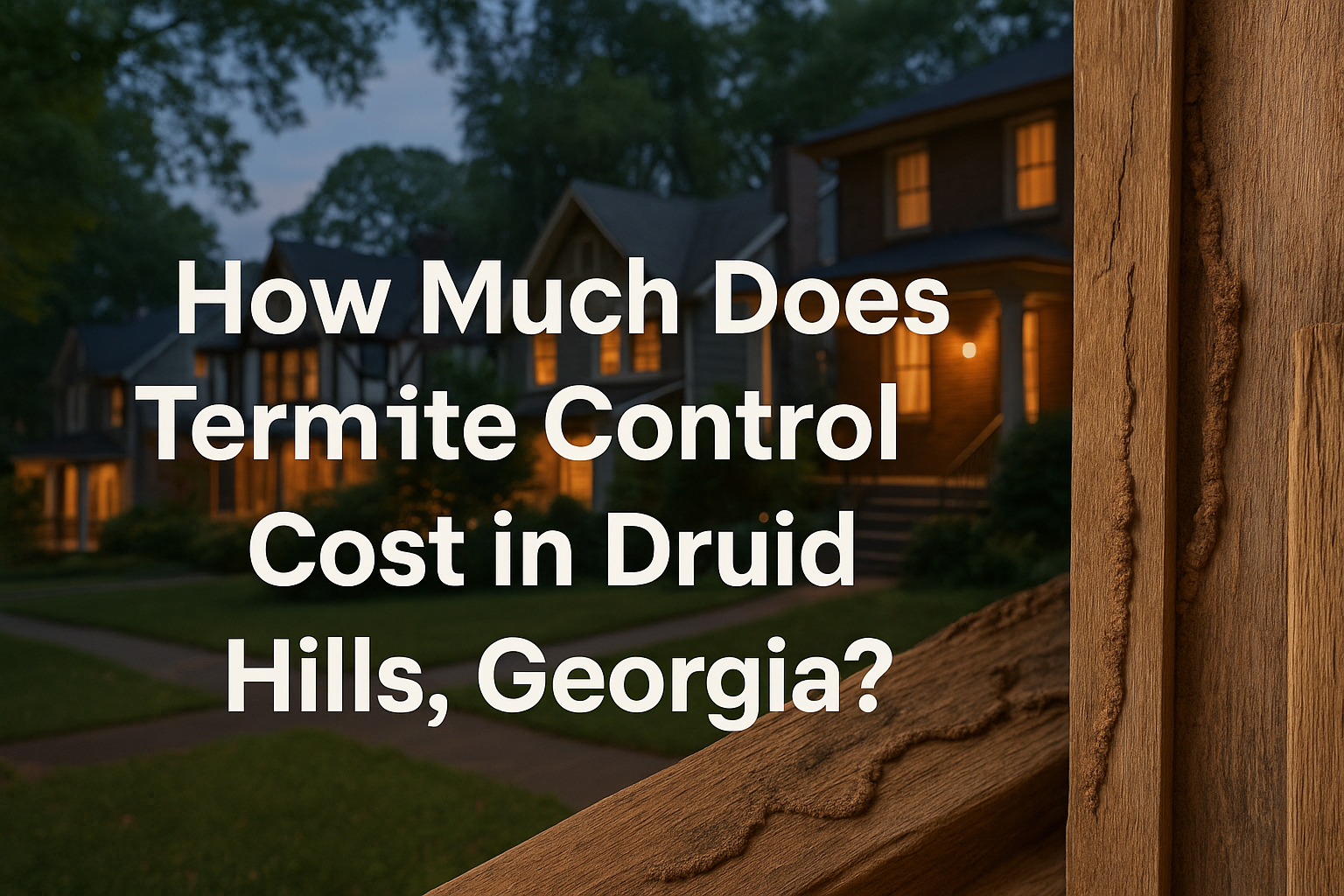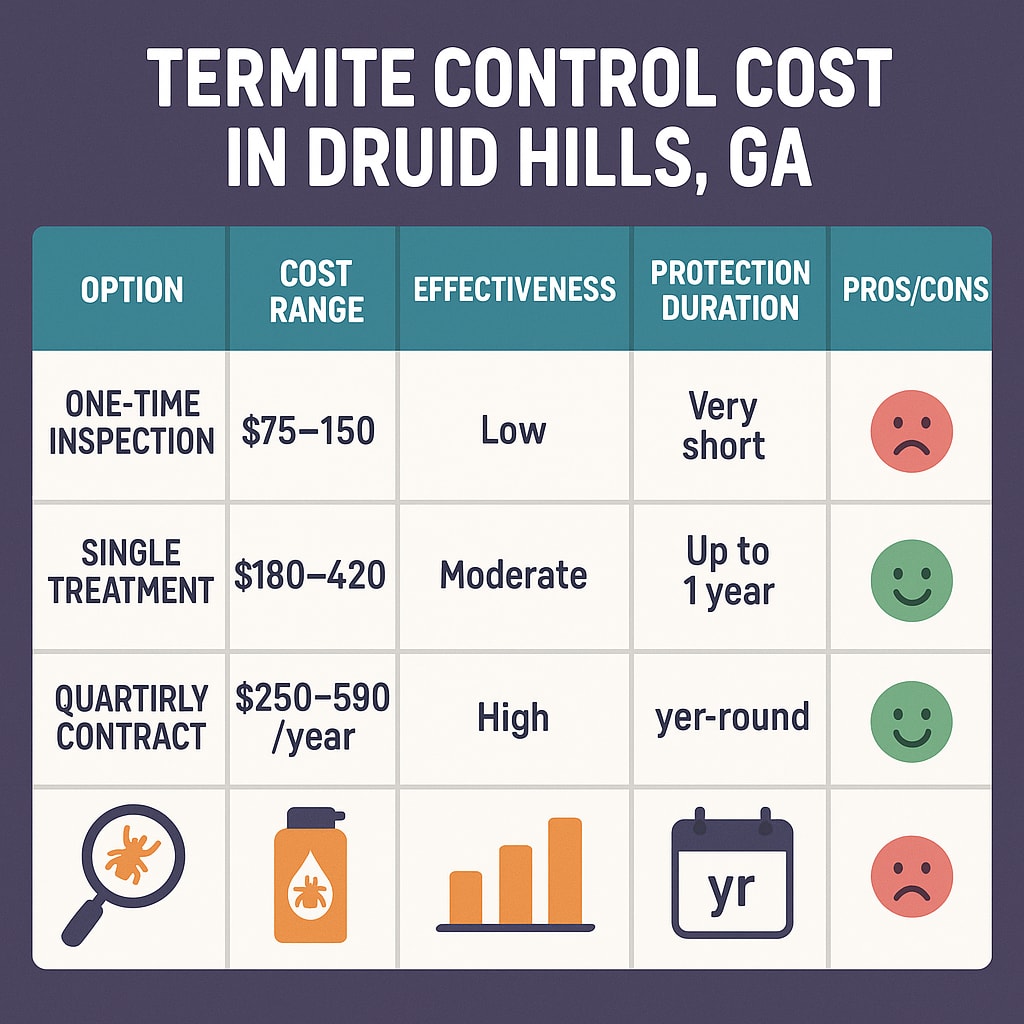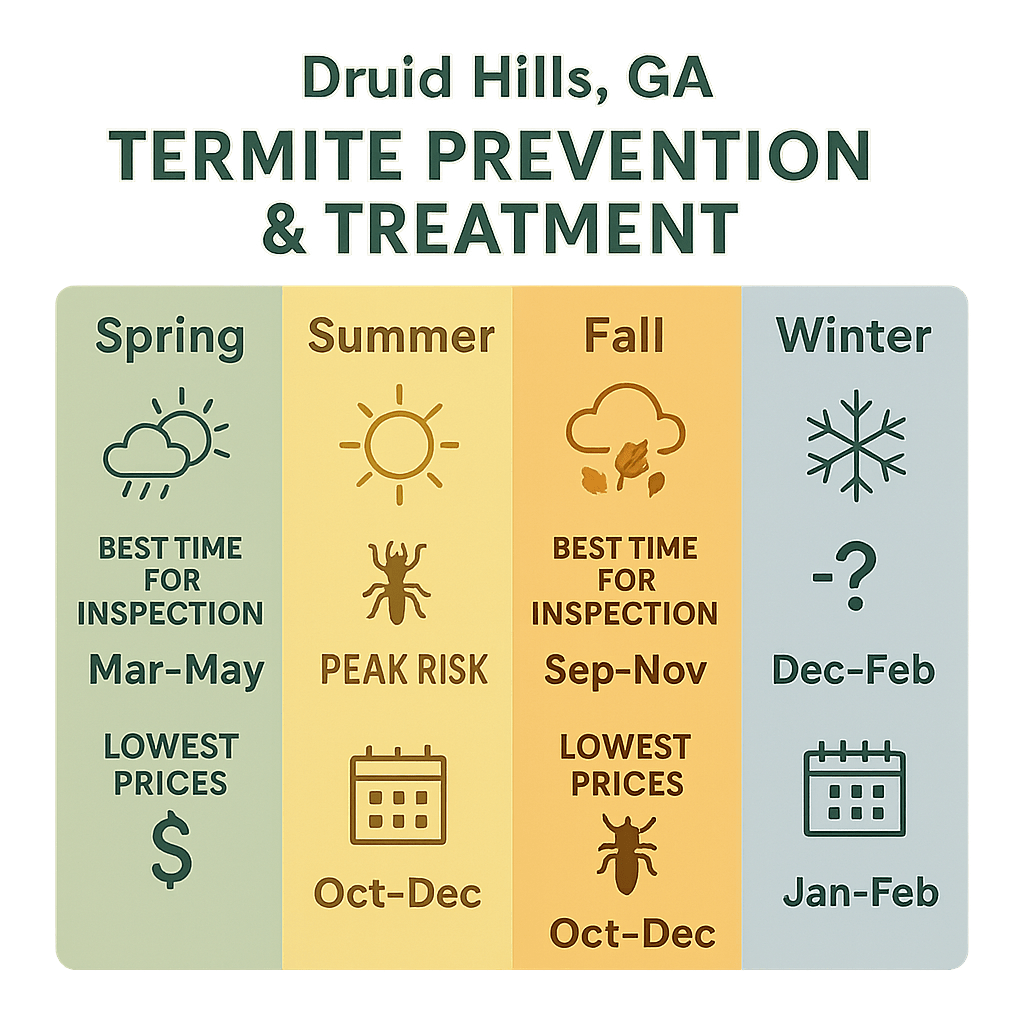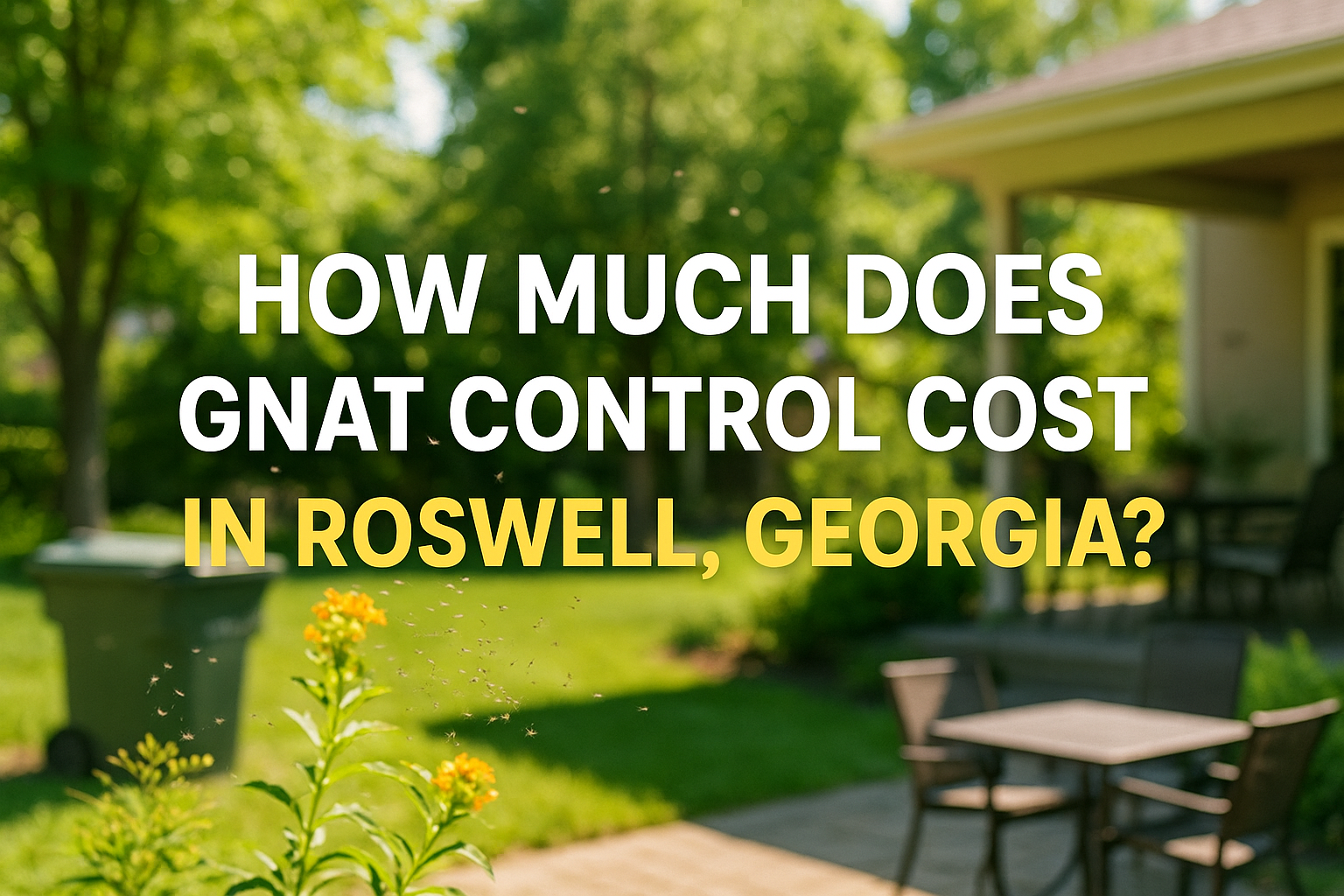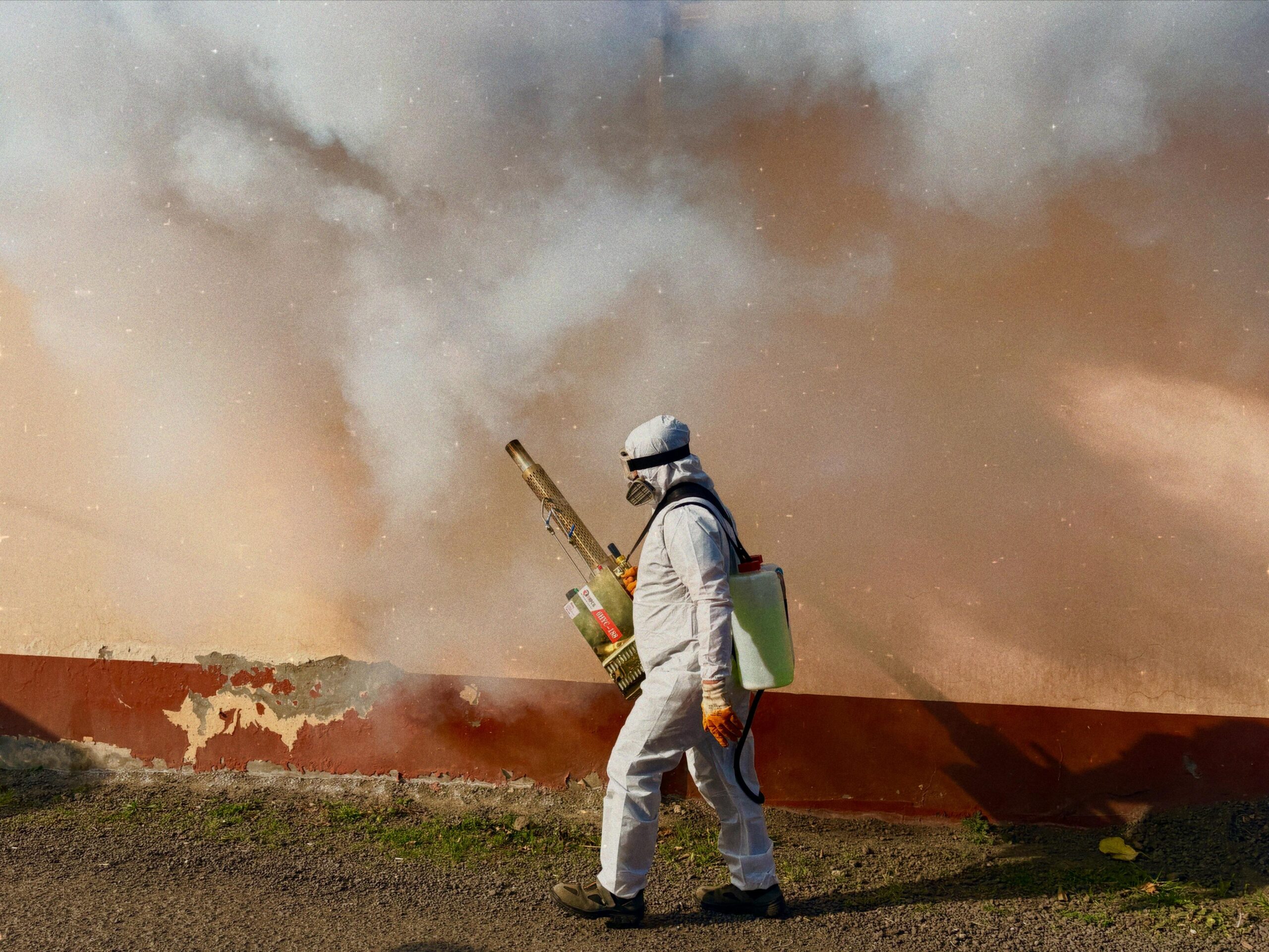Termites in Druid Hills: Why Acting Fast Matters
If you own a home in Druid Hills, you already know the charm of historic neighborhoods like Emory Village, Fernbank, and Chelsea Heights. Unfortunately, those same mature trees and old foundations can make your property a hot spot for termites. Thanks to Georgia’s warm, humid weather, termites thrive here nearly year-round. They’re not just a nuisance—they can quietly chew through support beams, floor joists, and more before you ever spot the first sign of trouble. Left unchecked, the damage can be massive and the repair bills even worse, which is why many homeowners research termite control cost Druid Hills GA early to stay protected.
Don’t wait until you see those telltale wings or mud tubes on your foundation. A typical termite inspection in Druid Hills costs between $75 and $150—well worth it for peace of mind. If you want to keep your investment safe year after year, a prevention contract generally runs from $180 up to $945 annually. That price tag depends on how often you need service and how serious the termite activity is in your area. With property values sitting among the highest in metro Atlanta, a little upfront protection easily beats thousands in structural repairs later on.
Pest control isn’t a “nice to have” around here—it’s a smart move for anyone who wants lasting value from their home. Stick with us as we break down your termite service options, compare costs, and walk you through what makes termite prevention in Druid Hills a true must-have for local homeowners.
What Really Affects Termite Control Pricing in Druid Hills
If you’re trying to budget for termite inspection and protection in Druid Hills, there’s not one simple answer. Termite control cost Druid Hills GA can jump around quite a bit depending on a few things specific to your property and situation.
- Home Size & Layout: Bigger homes—think the classic bungalows in Medlock Park or those spacious estates near Lullwater—simply take more time, effort, and product to inspect and protect. If you’ve got extras like a crawlspace, basement, or detached garage, expect the price to climb. A small home might just need a straightforward application, but multi-story or complex setups need more attention.
- Infestation Severity: Catching termites early usually means a less expensive fix. But if things have been brewing for a while, or you’re already seeing noticeable damage, it takes more thorough treatments—often multiple visits and sometimes even switching from an annual to a monthly schedule.
- Treatment Type: Not all termite treatments are created equal. Traditional liquid barriers, advanced bait systems, and follow-up checks all have different costs. Bait stations tend to be pricier upfront but offer ongoing monitoring, while liquid treatments might be more affordable—if your property qualifies.
- History & Age of Property: Older homes or lots with a history of termites usually need extra protection. Sometimes, these situations won’t qualify for basic contracts, and you’ll want a more comprehensive approach—think specialized products or closer monitoring.
So what does all this mean for actual numbers? When looking at termite control cost Druid Hills GA, an annual termite contract for a smaller home might be under $300 for a basic system. Homes with larger footprints or trickier access can easily run $900 or more, especially if you need premium service or repairs. Don’t be surprised if special needs like slab foundations or finished basements require custom quotes.
Best advice: don’t guess. Bring in a local expert who really knows Druid Hills’ neighborhoods and what’s going on below the surface. Get a tailored quote after a proper inspection, so you’ll know exactly what you’re dealing with and the right level of protection your home needs.
What Really Affects Termite Control Pricing in Druid Hills
If you’re trying to budget for termite control cost Druid Hills GA, there’s not one simple answer. Price tags can jump around quite a bit depending on a few things specific to your property and situation.
- Home Size & Layout: Bigger homes—think the classic bungalows in Medlock Park or those spacious estates near Lullwater—simply take more time, effort, and product to inspect and protect. If you’ve got extras like a crawlspace, basement, or detached garage, expect the price to climb. A small home might just need a straightforward application, but multi-story or complex setups need more attention.
- Infestation Severity: Catching termites early usually means a less expensive fix. But if things have been brewing for a while, or you’re already seeing noticeable damage, it takes more thorough treatments—often multiple visits and sometimes even switching from an annual to a monthly schedule.
- Treatment Type: Not all termite treatments are created equal. Traditional liquid barriers, advanced bait systems, and follow-up checks all have different costs. Bait stations tend to be pricier upfront but offer ongoing monitoring, while liquid treatments might be more affordable—if your property qualifies.
- History & Age of Property: Older homes or lots with a history of termites usually need extra protection. Sometimes, these situations won’t qualify for basic contracts, and you’ll want a more comprehensive approach—think specialized products or closer monitoring.
So what does all this mean for actual numbers? Around Druid Hills, an annual termite control cost Druid Hills GA for a smaller home might be under $300 for a basic system, but homes with larger footprints or trickier access can easily run $900 or more, especially if you need premium service or repairs. Don’t be surprised if special needs like slab foundations or finished basements require custom quotes.
Best advice: don’t guess. Bring in a local expert who really knows Druid Hills’ neighborhoods and what’s going on below the surface. Get a tailored quote after a proper inspection, so you’ll know exactly what you’re dealing with and the right level of protection your home needs.
Why Druid Hills Homes See Different Termite Risks and Costs
If you live in Druid Hills, you already know this isn’t just any Atlanta neighborhood. The massive old oaks, crepe myrtles, and hundreds of historic homes give this area tons of charm — and, believe it or not, a perfect recipe for termite trouble. The humid Georgia weather is part of it, but your house’s structure and the specific street you’re on can play a big role in how much termite control is needed, and what kind of bill you’ll get.
Let’s talk climate first: Every spring and summer, when Druid Hills gets those classic warm rains, termites wake up and go on the move. Subterranean termites love damp soil, especially right after storms, so every crawlspace, stacked woodpile, or shaded foundation basically becomes an open invitation. The city’s famous summer humidity? That just keeps things moist all season, making termite colonies a year-round concern.
Your home’s age and style come next. If you own one of the grand old houses in Emory Grove, Springdale Heights, or around Lullwater, termite treatment is usually more intense — and pricier. Historic homes often have wood framing, basements, or crawlspaces that are harder (and more expensive) for pest pros to fully treat. Old pipes and shifting soil around these structures don’t help either, sometimes opening cracks termites can sneak through. On the other hand, if you’re in a brick house on a slab foundation, you’re a bit better off, but not out of the woods. Termites only need one hidden moisture pocket or a hairline window ledge gap to get inside.
- Wood Frame & Crawlspace Homes: More labor, more treatment points, generally higher costs.
- Brick & Slab Homes: Fewer easy entryways, but susceptible to water drainage issues and hidden leaks.
- Landscaping: Plants or mulch beds hugging the foundation raise risk by trapping moisture and giving termites cover.
- Neighborhood-Specific Factors: Soil type varies by block, and some areas get heavier runoff, meaning extra moisture and, you guessed it, more termite activity.
- Local Codes/Maintenance: Older construction might not meet current termite-prevention standards, leading to custom treatment plans.
Bottom line: In Druid Hills, your exact risk and control costs depend on everything from your gutters to your garden. If you’re thinking about protecting your classic home — or even your newer build — knowing these local factors can save you money and headaches down the road.
Simple Ways to Stop Termites Before They Start
Keeping termites out of your Druid Hills home doesn’t have to cost a fortune—or add hours to your to-do list. While many homeowners worry about termite control cost Druid Hills GA, prevention is really about making your place less welcoming to these wood-hungry pests. Most folks are surprised at how a few quick changes and a little routine attention help keep termites (and those hefty pest control bills) away.
- Move Firewood Away from the House: Termites love firewood. Keeping any wood piles or scrap lumber at least 20 feet from your foundation can make a big difference. Stack it up on a platform if you can, instead of ground level.
- Clean Out Gutters Often: Blocked gutters mean extra moisture—exactly what termites are after. Give gutters a quick clean each season so water properly moves off your roof and away from your walls.
- Check Your Downspouts: Water pooling near the base of your home invites termite trouble. Point downspouts and splash blocks so water drains several feet away from the foundation. A quick fix with an elbow or extender does wonders.
- Trim Landscaping Away from Your House: If you’re in Lullwater Preservation, Druid Hills Golf, or anywhere with lush greenery, make sure plants, mulch, and ground cover aren’t touching your siding. Leave a gap so termites can’t jump from moist mulch straight into your walls.
- Seal Gaps and Cracks: Walk around your home’s outside walls and seal up any little cracks you find—especially where pipes run inside. You’ll block termite entry points and save on energy bills, too.
- Peek Into Basements and Crawl Spaces: Give these areas a quick look every season, checking for mud tubes or tiny wood shavings. Catching signs early keeps costs low and damage minimal.
- Don’t Skip the Annual Professional Inspection: Many local termite contracts include a yearly check. Don’t pass this up! Pros will spot what you might miss and offer quick fixes before small problems get expensive.
- Adjust Service After Rain or Renovations: Wet weather ups the termite risk. If we’ve had heavy storms, or you’ve recently added on to the house, touch base with your pest provider. It’s smart to check if more frequent monitoring makes sense for the season.
Getting ahead of termites in Druid Hills is all about consistent, simple habits. Catching little issues with regular checks and a few preventive upgrades keeps your home safe, your monthly bills down, and the peace of mind high. If you stay proactive, termites won’t stand a chance.
When’s the Right Time to Book a Termite Inspection in Druid Hills?
If you want to stay a step ahead of termites here in Druid Hills, timing really is everything. The busiest months for catching an infestation are late spring into early summer—think April through June. That’s when you’re most likely to spot the winged swarmers or see signs of damage. In neighborhoods with lots of trees, like the Emory Village area or near Fernbank Forest, termites are definitely more active during these months. Local pest pros say their phones ring off the hook every spring, so if you’re booking an inspection during the peak, expect higher demand and possibly less flexible scheduling.
Here’s one local secret: fall and winter are actually fantastic times to get ahead of termites. Business is slower for pest control companies, so you’ll often find off-season discounts on initial inspections, termite bonds, or preventive treatments. That means you can usually lock in a lower rate for early prevention rather than scrambling when everyone else is rushing to book.
- Schedule spring inspections to spot early activity before termites get a foothold.
- Book treatments or contracts in late fall or winter for potential savings—and give your home a jumpstart on protection before swarming season returns.
- Already have a termite bond? Use the quiet winter months for your annual follow-up. It’s easier to schedule, and you’ll have peace of mind all year.
In a nutshell, don’t wait for visible damage to call in the pros. Take advantage of off-peak pricing when possible, and plan at least one thorough inspection each year—preferably before spring kicks into high gear. Knowing these seasonal trends keeps you two steps ahead of termites, saves you money, and protects your Druid Hills home in the long run.
Don’t Wait—Protect Your Druid Hills Home Today
If you’re worried about termites sneaking around beneath your floorboards or eating away at your peace of mind, it’s time to get ahead of the problem. Even the smallest signs of termites can turn into costly headaches down the road. At Anthem Pest Control, our team is here to make protecting your home easy and stress-free.
We offer free, no-obligation property assessments for homeowners all over Druid Hills—whether you live close to Emory, in Chelsea Heights, or tucked away in a quiet neighborhood. When you call us, you’ll get honest advice, a custom treatment plan that fits your home, and clear pricing—no pushy sales talk.
Ready to get your free quote or just want to chat about next steps? Give us a call at 877-3718-5196 or visit our website now. Let’s stop termites before they become a real problem!
Answers to Your Termite Questions in Druid Hills
If you’ve got termites on your mind, you’re not alone. Homeowners all over Druid Hills ask plenty of questions about how termites operate, what their real risks are, and what’s worth investing in for solid peace of mind. Here’s what you need to know, straight from local experts who deal with these pests day in and day out.
- How often do I need a termite inspection in Druid Hills?
With our humid Georgia climate, termites never really take a break. The smart move is having a professional inspection every single year to catch issues early—before real damage starts. - What does a typical termite prevention contract cover?
Most contracts offered by local pros bundle in an annual inspection, base-level preventive treatments, and a warranty against any future termite damage. That means if termites pop up after you’ve got a contract, they’re back to handle it so you don’t have to sweat. - Do some Druid Hills neighborhoods have more termite trouble?
Absolutely. If you live in an older, wood-framed place or somewhere with dense trees—think Emory Grove or the Lullwater area—you’re at higher risk. Termites love aging wood and shade, so those beautiful leafy streets can also bring a few headaches. - What’s the deal with a one-time treatment versus a yearly contract?
If you’ve got termites right now and need them gone, a one-time treatment does the job—right now. But long-term, you’re rolling the dice if you don’t keep an eye out. Contracts build in regular inspections and ongoing treatments to keep your home protected year after year. - Can I wipe out termites with store-bought sprays?
Honestly? You might slow them down, but Georgia termites are tough. Professional teams use products and methods that cover the whole threat—what’s hiding inside the walls, not just what you see. - Does homeowner’s insurance pay for termite damage?
We hate to say it, but no. Most insurance won’t help you with termite repairs since it’s considered preventable. That’s another reason annual protection is smart. - How fast does termite treatment work?
Once your home is treated, you’ll usually notice a decrease in activity within days. But ongoing contract follow-ups are key for making sure the problem stays solved, not just hidden.
If you’ve got more questions or you’re ready for a real plan to protect your home, reach out to a local termite control pro in Druid Hills. It’s one less thing to lose sleep over.

